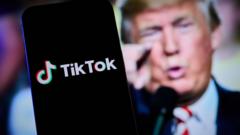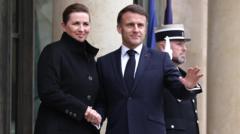In a surprising turn of events, TikTok has resumed its services for 170 million users in the US after President-elect Donald Trump expressed intentions to provide the app with a reprieve from a national security ban.
TikTok Resumes Services in the US Following Trump's Intervention

TikTok Resumes Services in the US Following Trump's Intervention
President-elect Donald Trump's pledge allows TikTok to restore access for its American users.
On Saturday evening, TikTok ceased operations following the enactment of a law that mandated its discontinuation in the US, leading to widespread confusion among its users. However, Trump announced on Sunday that he would take executive action to delay the law, enabling negotiations regarding TikTok's future in the country. Following this declaration, TikTok began restoring service and expressed gratitude towards Trump for his assurances.
This rapid restoration signifies potential avenues for collaboration, as TikTok seeks to navigate the complex legal landscape posed by its Chinese parent company ByteDance, which had previously defied a law requiring it to divest its US operations. Despite a Supreme Court ruling that upheld the law, legal experts suggest Trump's executive order could prevent immediate enforcement, although the details surrounding the legal authority for this intervention remain unclear.
Contrary to his prior support for a ban on the app, Trump has adopted a newfound endorsement of TikTok, citing the engagement his campaign garnered through the platform during the previous election cycle. His administration's actions leads many to speculate about the interplay of business interests and national security concerns that have characterized the ongoing TikTok saga.
While TikTok's legal battles continue, there remains uncertainty regarding the support it could receive from app stores and hosting services. The possibility of local bans also lingers, as several states have initiated legal actions against the platform. As the situation develops, commentators emphasize the need for a resolution that addresses both national security concerns and the interests of TikTok's extensive user base in the United States.
Overall, the unfolding events underscore the evolving dynamics of social media regulation in the US, placing TikTok at the intersection of technology, politics, and public discourse.
This rapid restoration signifies potential avenues for collaboration, as TikTok seeks to navigate the complex legal landscape posed by its Chinese parent company ByteDance, which had previously defied a law requiring it to divest its US operations. Despite a Supreme Court ruling that upheld the law, legal experts suggest Trump's executive order could prevent immediate enforcement, although the details surrounding the legal authority for this intervention remain unclear.
Contrary to his prior support for a ban on the app, Trump has adopted a newfound endorsement of TikTok, citing the engagement his campaign garnered through the platform during the previous election cycle. His administration's actions leads many to speculate about the interplay of business interests and national security concerns that have characterized the ongoing TikTok saga.
While TikTok's legal battles continue, there remains uncertainty regarding the support it could receive from app stores and hosting services. The possibility of local bans also lingers, as several states have initiated legal actions against the platform. As the situation develops, commentators emphasize the need for a resolution that addresses both national security concerns and the interests of TikTok's extensive user base in the United States.
Overall, the unfolding events underscore the evolving dynamics of social media regulation in the US, placing TikTok at the intersection of technology, politics, and public discourse.




















